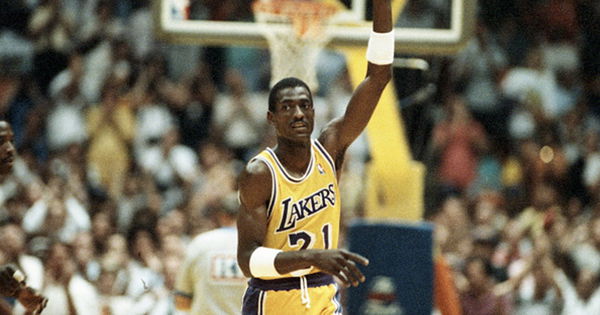
via Imago
Laker forward Michael Cooper raises his finger to signify the Lakers are #1 at the end of the game 6/4. Cooper threw in 6 three point baskets in 7 tries.

via Imago
Laker forward Michael Cooper raises his finger to signify the Lakers are #1 at the end of the game 6/4. Cooper threw in 6 three point baskets in 7 tries.
“I really appreciate being Coop’s teammate. He really helped me succeed,” said Kareem Abdul-Jabbar after Michael Cooper’s 2024 Naismith Memorial Basketball Hall of Fame induction. And on top of that, the Lakers are set to retire his #21 on January 13. For a guy who helped raise five of those 17 championship banners, the honor feels just right. Standing at 6-foot-5, Coop was a defensive powerhouse, one of the finest athletes to ever play in LA. His legacy, both in the rafters and on the court, is undeniable.
Growing up in California, Coop stayed close to home, building his career right in the heart of LA. With five NBA championships and a Defensive Player of the Year (DPOY) title in 1987 under his belt, his journey wasn’t just impressive—it was legendary. Beyond his NBA career, Coop found success as a coach, but his latest recognition demands a look back at how he became the smiley, defensive anchor we all remember.
ADVERTISEMENT
Article continues below this ad
Coop’s NBA journey
As a teen standout at Pasadena High School, Coop’s early athletic promise took him to Pasadena City College and later to the University of New Mexico. There, he averaged an impressive 16.3 points, 5.7 rebounds, and 4.2 assists, leading the Lobos to a WAC title. Though he wasn’t a top draft prospect, Cooper entered the 1978 NBA Draft with multiple honors under his belt.
Picked 60th overall by the Lakers in the third round, no one expected Coop to become a central figure of the iconic Showtime Lakers. Protecting legends like Magic Johnson, Kareem Abdul-Jabbar, and James Worthy, Coop was a lockdown defender for 12 seasons. He played 873 games for the Lakers, averaging 8.9 points, 4.2 assists, and 3.2 rebounds—a stat line that only scratches the surface of his impact. Fans loved him, often roaring “Cooooop” whenever he made a play.

His nickname “Buttercup” may have seemed soft, but don’t let that fool you. Coop was a beast on defense, earning DPOY honors in 1987. Even Larry Bird admitted, “Coop was the most difficult player to get past.” Whether it was the famous “Coop-a-loop” or his defensive genius, Michael Cooper’s legacy is set in stone, right where it belongs—among the greats.
What’s your perspective on:
Michael Cooper: The most underrated defender in NBA history? Lakers fans, what do you think?
Have an interesting take?
Coaching journey
After wrapping up his playing career, Michael Cooper found himself back with the Lakers, thanks to Jerry West. In 1994, Coop returned as West’s special assistant, marking the start of his coaching journey. When his best friend Magic Johnson briefly stepped into a coaching role, Cooper was right there on his staff. By 1999, he made a seamless transition to the WNBA’s LA Sparks coaching team, helping them reach the playoffs for the first time. His impact was felt immediately, earning him the head coach position the same year.
Under Cooper’s leadership, the Sparks transformed into champions. He guided them to back-to-back WNBA titles in 2001 and 2002, even earning the WNBA Coach of the Year award. The team flourished under his direction, and he came incredibly close to securing a third championship.
ADVERTISEMENT
Article continues below this ad
But Coop didn’t stop there. He returned to the NBA as an assistant coach with the Denver Nuggets and later took on coaching roles in various leagues, including the D-League, and even a second stint with the Sparks. He coached at USC, Ice Cube’s Big3 league, and at Cal State, staying in the game through 2023 despite facing some tough challenges along the way.
Michael Cooper’s resilience
In 2014, Michael Cooper faced one of his toughest battles—tongue cancer. Diagnosed early, Coop underwent surgery to remove 55 lymph nodes and required 35-40 stitches. Despite the gravity of his diagnosis, he kept it mostly to himself, with his wife, Yvonne, and their four kids—Michael, Simone, Miles, and Nils—remaining in LA while he coached the Atlanta Dream. Yet, even in the midst of it all, his teammates stood by him, providing support when he needed it most.
ADVERTISEMENT
Article continues below this ad
With a six-inch scar curving from his left ear to his neck, Cooper didn’t let his recovery slow him down. Remarkably, he took just 10 days to recuperate before returning to the sidelines. His persistence was unshaken, even if his voice had developed a slight slur because of the surgery. Ever the jokester, Coop remarked that his new voice made him more intimidating when arguing with referees.
But for all his goofiness, Cooper did realize something important: he wasn’t forgotten. After the surgery, Magic Johnson, Kareem Abdul-Jabbar, and Pat Riley all checked in on him. Nither, LA would forget “Cooooop,” and with the upcoming retirement of his #21 jersey, his place in Lakers history is solidified for all to see.
ADVERTISEMENT
ADVERTISEMENT
ADVERTISEMENT
ADVERTISEMENT


Michael Cooper: The most underrated defender in NBA history? Lakers fans, what do you think?